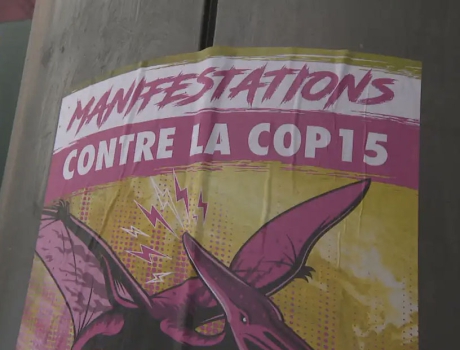Action Alert
You are here
Protests begin at the COP 15 conference in Montreal

December 8, 2022
From December 7 - 19 the UN Biodiversity Conference of Parties (COP15) meetings will convene in Montreal. Recognizing that biodiversity will continue to worsen under "business-as-usual", the official goal of the conference is to plan for a "transformation in society's relationship with biodiversity" by 2050.
This is too slow. These meetings that began after the 1992 Rio Earth Summit have been ineffective at halting this crisis that risks "generating large-scale abrupt or irreversible environmental changes".
But grassroots climate and ecological justice struggles are growing and demanding action now. Demonstrations have already begun in Montreal and thousands are expected at the rally and march on December 10thto build these links and further the struggle for a livable future.
Justin Trudeau spoke at the conference of the need to protect biodiversity but his own government has a horrible record on destruction of the natural world. He is building pipelines and expanding tar sands development and has done nothing to protect biodiversity in the Canadian state. Activists are planning to bring a 3000 pound, 750 year old cutting of an old growth tree that was cut down under his watch.
Trudeau's speecch was drowned out by Indigenous Land Defenderswho called out this hypocrisy as the conference opened.
Mass species extinction
250 million years ago around 95% of marine species and 70% of land species disappeared in the worst mass extinction episode in the history of life on Earth. The "Great Dying" was caused by global warming from rising carbon dioxide concentrations in the atmosphere - at that time because of extensive volcanic activity - trapping more and more of the sun's energy and changing environments too quickly for the vast majority of species to evolve.
This time around the mass species extinction is being caused by human activity, particularly carbon emissions which are rising due to our economy's reliance on burning more and more fossil fuels for energy.
Species extinction is also driven by: habitat loss through clearcut logging, urban sprawl and other land use changes; fertilizer runoff and ocean acidification devastating marine life; chemical and plastic pollution strangling marine and land life; industrial farming lowering biodiversity and increasing pandemic likelihood; and on, and on.
Some scientists argue that the transition to agriculture 11,000 years ago was when humans began having a negative impact on the natural world. Others contend that humans have always been a problem species.
But it is only since the mid-20th century that the species extinction rate became more rapid than ever before in humanity's 200,000 years. It currently stands between 100 and 1000 times higher than the baseline fossil record rate.
This is an indictment of capitalism.
Karl Marx wrote that capitalism "produces conditions that provoke an irreparable rift in the interdependent process of social metabolism, a metabolism prescribed by the natural laws of life itself."
Human beings live from and are a part of nature, and they "must maintain a continuing dialogue with it" if they are not to die. The labour process "is the universal condition for the metabolic interaction between [humans] and nature, the everlasting nature-imposed condition of human existence."
Early humans foraged and hunted in egalitarian groups, working to sustain the environment they relied on to survive. After the development of agriculture, humans had for the first time, a surplus of produced goods and a new layer of people emerged to at first protect and then control the surplus. This emergence of class society changed the relationship to nature. But it is under capitalism that the rift between people and the natural world reached it's current and unsustainable state.
Under capitalism, exploitation of workers is the source of profit. They are alienated from: the products of their labour; the production process; from other workers; from their human nature; from the natural world.
To bank profit, bosses have to sell the commodities in competition with other capitalists. Competition forces bosses to maximize profits to the detriment of workers and the environment. They must accumulate capital or risk going out of business.
Raw materials are free gifts of nature for the boss. As the system expanded, imperialist capitalist states pushed outwards for new sources. Indigenous peoples globally were removed from their land through violence, starvation and trickery to extract raw materials. Settler colonial states like Canada formed in this process and the violent removal of Indigenous peoples from the lands they stewarded for many thousands of years continues to this day.
Indigenous blockades of extractive infrastructure pose a challenge to private property rights and asserts Indigenous Laws, Knowledge and Spirituality - Indigenous Land Defenders have kept carbon emissions from rising as quickly as they might have, and 80% of the biodiversity that still exists is on lands controlled by Indigenous peoples worldwide.
Furthermore, when workers go on strike for better wages and working conditions, and challenge the boss' control of production, they develop organizational forms of collective struggle. This challenges the profit system and can develop into political confrontations with the state overseeing capital accumulation.
But bosses and the state use anti-Indigenous and other forms of racism, sexism, homophobia, transphobia and other oppressive ideas to increase profits and prevent collective action.
Building a movement of movements that builds concrete solidarity between all these struggles and overcomes divisions is crucial to developing a force that can smash capitalism and build a world that meets the needs of people and the living planet before it is too late.
Section:









